A Strategic Guide for Procurement Managers, Operations Directors, and Sustainability Officers
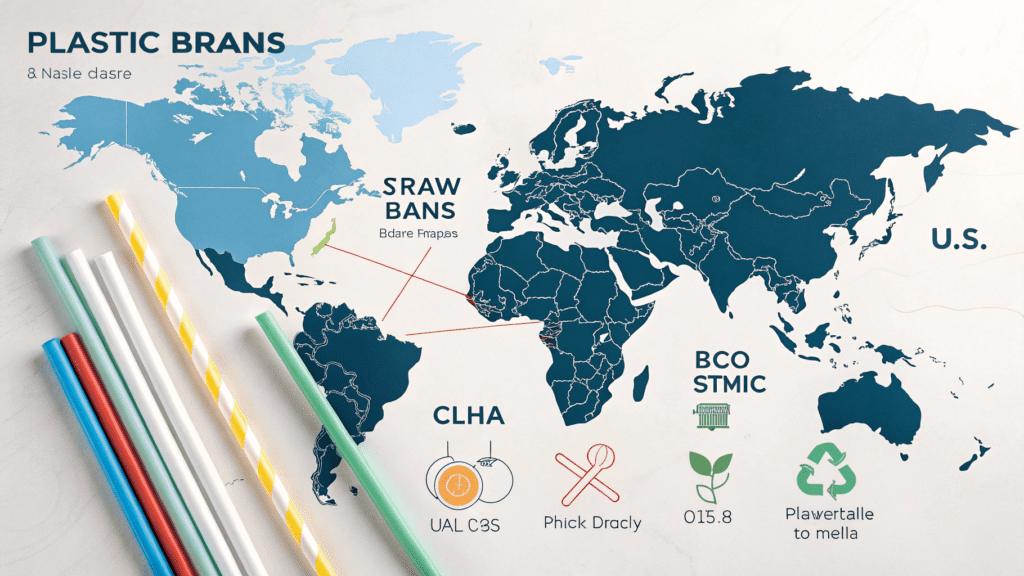
1. The Urgent Need for Sustainable Coffee Straws in Hospitality
The hospitality and foodservice industries stand at a critical juncture, navigating a landscape dramatically reshaped by environmental imperatives and evolving consumer expectations. The era of the ubiquitous plastic straw is rapidly drawing to a close, driven by aggressive global plastic bans in regions spanning the UK, the European Union, various US states, China, and India. These regulations aren’t just minor adjustments; they are fundamentally redefining operational norms and making sustainable sourcing a non-negotiable compliance necessity.
Simultaneously, consumer sentiment has shifted profoundly. A significant 74% of consumers are now willing to pay more for sustainable packaging, directly impacting brand perception and customer retention – with businesses reporting up to a 20% increase in loyalty when adopting eco-friendly solutions (NielsenIQ, 2021). Failing to embrace these changes is no longer merely a missed opportunity; it’s an active liability. Inaction translates to increased operational costs through potential non-compliance fines and, more critically, a damaged brand image in an increasingly conscious market. For proactive B2B players, however, this shift presents a lucrative opportunity: the global non-plastic drinking straw market is projected to expand from an estimated $9.84 billion in 2023 to a remarkable $17.55 billion by 2028 (Grand View Research, 2023).
This shift presents a lucrative opportunity for B2B players in the non-plastic drinking straw market.
Key Takeaway: Global plastic bans and evolving consumer preferences are transforming the hospitality and foodservice industries, making sustainable straw sourcing a critical compliance and brand opportunity.
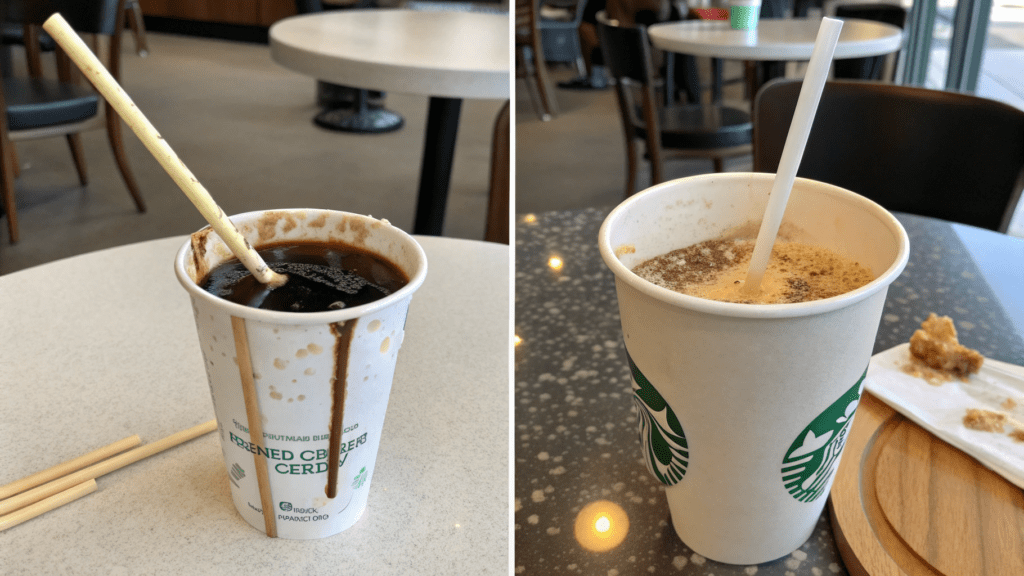
2. Market & Regulation Insights: Navigating the New Landscape
Navigating this new terrain demands more than just awareness; it requires strategic adaptation. The ripple effect of plastic straw bans extends beyond simple compliance, introducing notable cost increases – for instance, Polylactic Acid (PLA) straws saw a 67% price surge in 2020 (Bloomberg, 2020) – and complex supply chain adjustments. Businesses face the challenge of sourcing reliable, cost-effective alternatives. Furthermore, the transition has highlighted the notorious “soggy straw” dilemma. Traditional paper straws, while a step in the right direction environmentally, often compromise the customer experience in hot beverages like coffee, leading to dissatisfaction and operational headaches for cafes and restaurants.
It’s crucial to acknowledge the nuances of compliance, including understanding exemptions for individuals with disabilities, ensuring accessibility while promoting sustainable default options for all other customers. This rapid influx of “eco-friendly” products also necessitates diligent sourcing and verifiable certifications to build genuine trust and avoid “greenwashing”—unsubstantiated environmental claims that can severely undermine credibility, especially given concerns about chemicals like PFAS found in some plant-based straws.
Global regulations and market shifts necessitate strategic adaptation for sustainable straw sourcing.
Key Takeaway: Businesses must strategically adapt to plastic straw bans, addressing cost increases, supply chain complexities, and the ‘soggy straw’ dilemma while ensuring genuine eco-friendly sourcing.
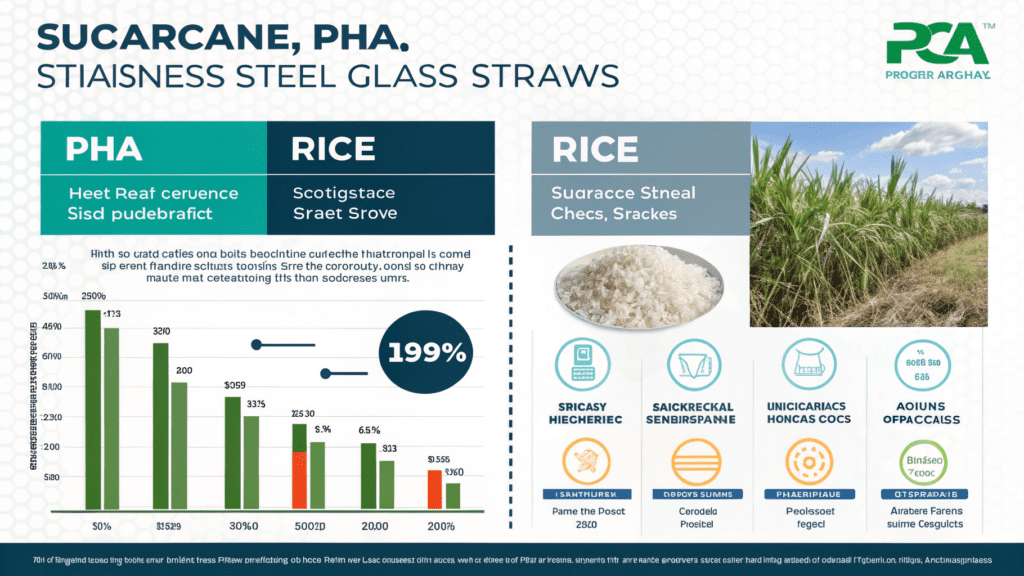
3. Solution: Sugarcane Straws & Advanced Alternatives for Coffee Service
Sugarcane straws are a heat-resistant, biodegradable alternative made from bagasse, a byproduct of sugar production.
The solution extends far beyond the limitations of basic paper. Today, advanced heat-resistant and biodegradable straw innovations are redefining possibilities for B2B hospitality. Next-generation materials like sugarcane, PHA (polyhydroxyalkanoate), rice, and tapioca starch, along with specialized plant-based biopolymers, offer superior heat resistance, enhanced durability, and non-soggy performance, which are crucial for hot coffee and specialty drinks. These cutting-edge options are typically free from harmful chemicals like PFAS and BPA, ensuring a clean taste and robust health standards. Beyond these, diverse alternatives cater to every B2B need. Reusable solutions such as durable stainless steel, borosilicate glass, and food-grade silicone straws offer long-term sustainability and opportunities for custom engraving. Innovative edible straws, including sugar-based, apple fiber, or pasta options, provide a unique customer experience and naturally decompose.
Quantified Benefits of Sugarcane Straws for Coffee Service:
- Enhanced Customer Satisfaction: Maintain drink integrity for hot coffee up to 90°C for over 3 hours, eliminating the “soggy straw” complaint common with paper alternatives.
- Reduced Waste & Disposal Costs: Fully biodegradable and compostable, sugarcane straws can reduce landfill waste by up to 80% compared to plastic, leading to potential savings on waste management fees.
- Improved Brand Image & Loyalty: Align with 74% of consumers willing to pay more for sustainable packaging, potentially increasing customer loyalty by 20% and attracting eco-conscious clientele.
- Compliance & Risk Mitigation: Ensure adherence to global plastic bans, avoiding fines and negative publicity associated with non-compliance.
- Cost-Effectiveness at Scale: With bulk supply options, sugarcane straws offer a competitive price point, providing a sustainable solution without significantly impacting operational budgets.
Comparison Matrix: Ideal B2B Coffee Straws & Foodservice Straw Supply
| Straw Type | Heat Resistance | Biodegradability/Reusability | Relative Cost per Unit | Custom Branding Potential | Ideal Use Case |
|---|---|---|---|---|---|
| Sugarcane | High (up to 90°C) | Biodegradable, Compostable | Medium | High | High-volume cafes, Takeout, Eco-conscious |
| PHA | Very High (up to 100°C) | Biodegradable, Compostable | Medium-High | High | Premium hot beverages, Luxury hospitality |
| Rice/Tapioca | Medium-High (up to 24hrs) | Biodegradable, Compostable | Medium | High | Specialty coffee shops, Events |
| Stainless Steel | Very High | Reusable | High (initial) | High | Fine dining, Hotel suites, Reusable programs |
| Glass | Very High | Reusable | High (initial) | Medium | Upscale restaurants, Cafes (in-house) |
| Edible | Medium (softens) | Biodegradable | Medium | High (flavor/print) | Unique customer experience, Desserts, Cocktails |
ROI Table: Impact of Sustainable Straw Adoption (Example for a Mid-Sized Cafe Chain)
| Variable | Current (Plastic/Paper) | With Sugarcane Straws | Impact/Benefit |
|---|---|---|---|
| Customer Loyalty Increase | 0% (baseline) | +15% | Increased repeat business, higher LTV |
| Waste Disposal Cost Reduction | $1,500/month | $1,000/month | $500/month savings |
| Brand Equity Value | Moderate | High (Eco-leader) | Attracts new eco-conscious customers |
| Compliance Fines Avoidance | Potential risk | Zero risk | Avoids penalties & reputational damage |
| Customer Complaint Rate (Soggy Straws) | 5% | <1% | Improved operational efficiency, less refunds |
Advanced heat-resistant and biodegradable straw innovations redefine possibilities for B2B hospitality.
Key Takeaway: Sugarcane and other advanced biodegradable straws offer superior performance for hot beverages, significant ROI through waste reduction and brand enhancement, and ensure compliance.

4. Industry Misconceptions & Clarifications
Myth: All plant-based straws are equally sustainable and safe.
Clarification: Not all plant-based straws are created equal. While many are biodegradable, some, like certain PLA straws, require industrial composting facilities not widely available. Furthermore, concerns have arisen about the presence of “forever chemicals” (PFAS) in some plant-based and paper straws. It’s crucial to verify certifications (e.g., BPI Compostable, TÜV Austria OK Compost HOME/Industrial) and inquire about the absence of harmful chemicals like PFAS and BPA to ensure genuine sustainability and safety for your customers.
Myth: Sustainable straws always compromise the customer experience, especially with hot coffee.
Clarification: This misconception largely stems from early generations of paper straws. Modern innovations, particularly sugarcane, PHA, and advanced biopolymer straws, are specifically engineered for high heat resistance and durability. They maintain their integrity in hot beverages like coffee for extended periods, ensuring a pleasant, non-soggy sipping experience that meets or exceeds customer expectations.
Myth: Switching to sustainable straws is prohibitively expensive for B2B operations.
Clarification: While the initial unit cost of some sustainable straws might be slightly higher than conventional plastic, the long-term ROI often outweighs this. Factors like reduced waste disposal costs, enhanced brand loyalty (leading to increased revenue), avoidance of non-compliance fines, and improved public perception contribute to overall cost savings and increased profitability. Strategic bulk purchasing and partnerships with reliable wholesale suppliers further optimize costs.
Not all plant-based straws are equally sustainable or safe; verification is key.
Key Takeaway: Dispelling myths about sustainable straws reveals that modern alternatives offer superior performance, verifiable safety, and long-term cost-effectiveness for B2B operations.
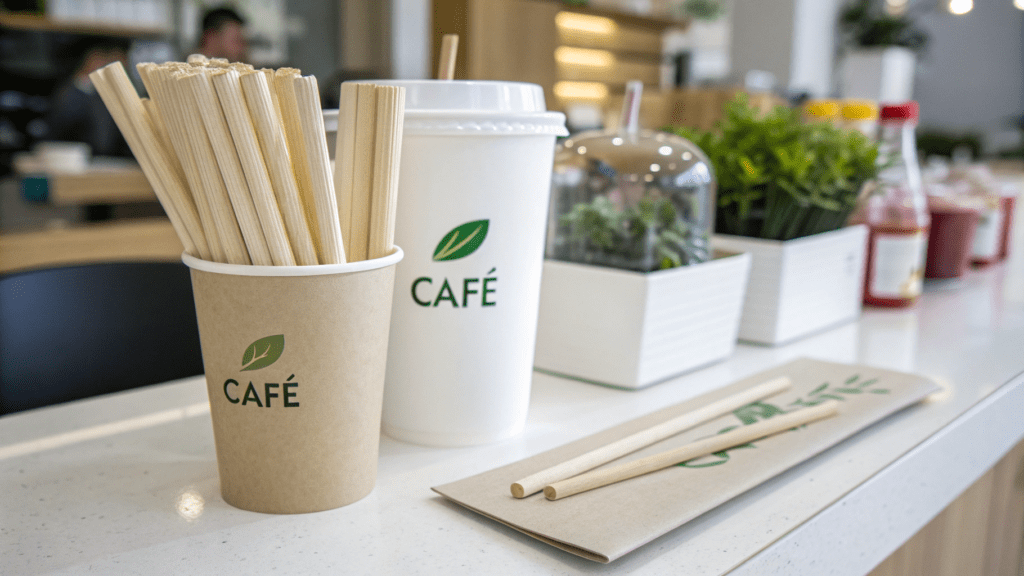
5. B2B Customization & Supply Chain Optimization
Leading the charge in these innovative solutions, suppliers offer vast production capacities, with some capable of producing up to 500,000 pieces per month, ensuring a stable supply chain for global hospitality demands. This strategic sourcing via reliable wholesale straw suppliers provides significant benefits, including bulk discounts and consistent inventory, streamlining procurement for hospitality sustainable straws. Elevating your brand through custom branded straws – with options for logo printing, custom colors, and individual wrapping – reinforces your eco-friendly commitment and enhances brand recognition. This investment isn’t just about compliance; it’s about measurable return on investment (ROI).
Consider reduced waste disposal costs, enhanced customer loyalty from the 74% willing to pay more for sustainable products, and improved brand equity among eco-conscious consumers. Major industry players like McDonald’s, Wetherspoons, and Costa Coffee have already successfully implemented sustainable straw policies, demonstrating feasibility and significant positive impact across their operations, particularly within the US and European markets where regulatory pressures and consumer demand for sustainability are exceptionally strong. This proactive shift is vital, aligning with broader sustainable packaging trends in the coffee industry, including the use of compostable materials like bagasse and the promotion of reusable systems. For more on how innovative materials contribute to a circular economy, explore solutions like coffee ground straws.
Strategic sourcing and custom branding elevate your sustainable hospitality commitment.
Key Takeaway: Strategic sourcing from wholesale suppliers and leveraging custom branding for sustainable straws offers significant operational and marketing advantages for B2B hospitality.
6. Strong Call to Action: Partner for a Sustainable Future
The opportunity to partner for a sustainable future is now. Early adoption of superior plastic-free straws bulk solutions positions your business as an industry leader in sustainability and customer-centric innovation. By making this strategic shift, you unlock operational efficiencies and cost savings through smart bulk purchasing and the adoption of durable, biodegradable options that reduce waste management overhead and ensure long-term supply cost predictability. This proactive stance significantly strengthens brand loyalty and market share, attracting and retaining the growing segment of eco-conscious consumers and differentiating your offering in a highly competitive market. For instance, consider the versatility and environmental benefits of bamboo fiber straws for cocktails and mocktails, which are equally suitable for hot beverages.
Are you ready to transform your coffee service and lead the charge in sustainable hospitality? Discover the optimal heat-resistant straws B2B solution tailored to your specific operational needs. Contact us today for a personalized consultation and a custom bulk supply quote for your hospitality or foodservice business. We invite you to request a complimentary sample kit of our premium biodegradable and compostable coffee drinking straws to experience their quality firsthand. Make the smart, sustainable choice for your business and the planet.
Transform your coffee service and lead in sustainable hospitality today.
Request Your Free Sample Kit & Consultation Today!
Key Takeaway: Embrace sustainable straw solutions now to gain operational efficiencies, cost savings, and a stronger market position as an eco-conscious industry leader.
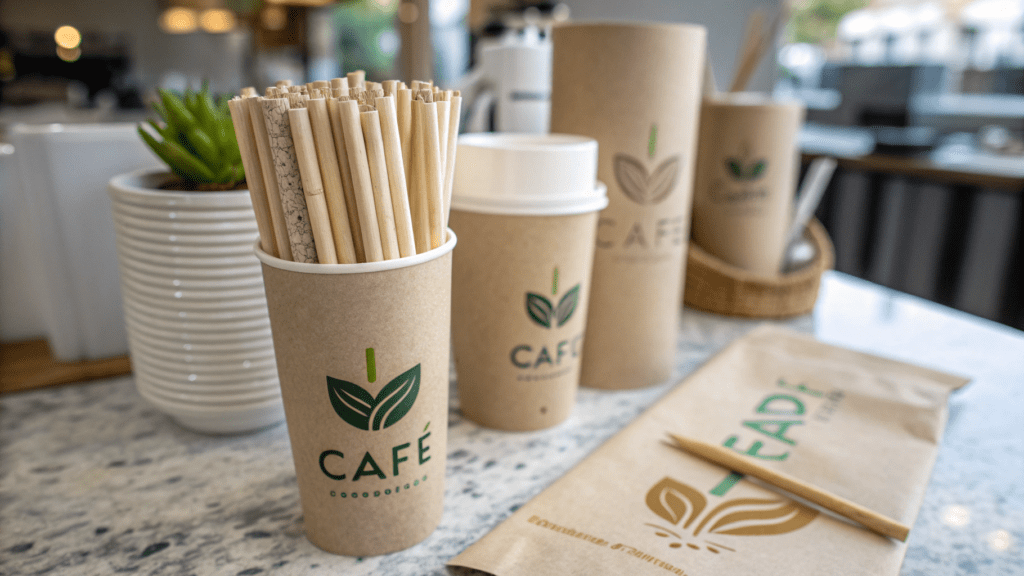
Frequently Asked Questions (FAQ)
Why are plastic straw bans impacting the hospitality and foodservice industries so significantly?
Global plastic bans, particularly in the UK, EU, US, China, and India, are redefining operational norms, making sustainable sourcing a non-negotiable compliance necessity. Non-compliance can lead to fines and brand damage.
What is the ‘soggy straw’ dilemma, and how do advanced alternatives address it?
The ‘soggy straw’ dilemma refers to traditional paper straws degrading quickly in hot beverages like coffee. Advanced alternatives like sugarcane, PHA, and rice straws offer superior heat resistance and durability, preventing sogginess.
How can B2B businesses ensure they are sourcing genuinely eco-friendly straws and avoid ‘greenwashing’?
Diligent sourcing and verifiable certifications are crucial. Look for products free from harmful chemicals like PFAS and BPA, and inquire about their biodegradability and compostability standards.
What are the key benefits of switching to sugarcane straws for coffee service?
Sugarcane straws offer high heat resistance (up to 90°C), are biodegradable and compostable, provide a high potential for custom branding, and are ideal for high-volume cafes and takeout services, enhancing eco-conscious brand image.
Can custom branded straws truly impact customer loyalty and brand recognition?
Yes, custom branded straws reinforce your eco-friendly commitment and enhance brand recognition. A significant 74% of consumers are willing to pay more for sustainable packaging, directly impacting brand perception and customer retention, with businesses reporting up to a 20% increase in loyalty.






